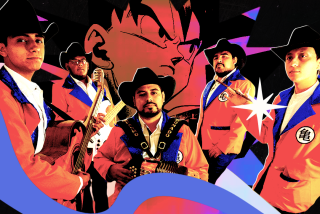MOVIE REVIEW : THE MANY ASPECTS OF EGO IN ‘MISHIMA: A LIFE’
“Mishima: A Life in Four Chapters” (at the Fine Arts on Friday) is a beautiful, deadly serious attempt by Paul and Leonard Schrader to illuminate the life--and death--of one of Japan’s most highly visible and self-propelling enigmas.
The life of Yukio Mishima (Ken Ogata) swung in violent arcs. He was a writer, disciplined enough to have published 40 novels and 18 plays by the time he was 42, and he was a flamboyant and dedicated hedonist; he idealized the pure, fierce ideals of the samurai, yet lived in a Western house with rococo furnishings; he was a publicly demonstrative husband and father, and a homosexual whose flair for bloody, sadomasochistic fantasy reached its peak in a widely circulated set of photographs of Mishima, in a draped loincloth and protruding arrows, as the martyred St. Sebastian.
Postwar Japan, with its tilt toward democracy, disgusted him. In the last two years of his life Mishima created the Shield Society, a private right-wing army pledged, among other ideals, to restore the divinity of the emperor. Finally, in late 1970, in the act that would sear him into the memory of most of the world, Mishima, with four Shield Society members, took over Eastern Army Headquarters in Tokyo. He delivered a harangue to its garrison from their general’s rooftop, then went inside and committed ritual seppuku (disembowelment), joined in death by a young cadet.
There is material enough here for three teeming films, which is almost what director Paul Schrader and his co-writer-brother Leonard have made. “Mishima’s” framework is formed by the chronological events of Nov. 25, 1970, the last day of Mishima’s life, shot in color. Intercut with that are biographical episodes going back to his childhood, shot in black and white with what director Schrader calls static composition. (Doubt him not.)
Finally, and most lyrically, there are excerpts from three of Mishima’s novels, with highly stylized sets by premier Japanese designer Eiko Ishioka. She has made everything, from a tacky ‘50s aluminum snack bar to a murder scene in which the assassin enters by slitting a backdrop scrim; her sets are audacious, emotional and a good deal of the time more thrilling than the action they accommodate.
“Mishima,” in Japanese with English narration spoken by Roy Scheider, has problems, complication of structure being only one. After four years of impassioned negotiations, Mishima’s widow’s “price” for use of his material was that the film omit any mention of her, her family or her husband’s homosexuality. Her stricture gives the film an indirectness which is the last thing it needs. The film makers’ compromise is to use three excerpts from his novels to mirror his psychological and sexual attitudes. The novels are “Temple of the Golden Pavilion,” “Kyoko’s House” (as yet untranslated and considered in Japan to be his first big failure) and “Runaway Horses.”
The idea is inventive, but it works only intermittently, and not in the most crucial “Temple of the Golden Pavilion,” a complex novel based on a true incident involving the need to destroy beauty. (Young Kabuki star Yasosuke Bando plays the stuttering acolyte; Koichi Sato is his sardonic, lame friend.) Without having read the full novel, audiences may find it a mysterious, opaque fragment.
“Kyoko’s House,” the most powerful story of the three, is of a narcissistic young actor (rock star Kenji Swado) and an older woman (Yasuaki Kurata) who “buys” him and lures him into sadomasochism. “Runaway Horses,” the most visually dramatic, is a story of a young cadet obsessed with suicide. Eiko’s sets are their most spectacular here.
But the greatest problem is that for all its correctness and all the beauty of its production (Philip Glass’ shimmering music, John Bailey’s exquisite camerawork), “Mishima” remains as tantalizing as that Golden Pavilion and as impossible to enter (almost impossible, too, to discuss in limited space). You may not be able to take your eyes from the screen, yet I suspect that comes as much from the film makers’ passionate conviction that Mishima is a fascinating man than from anything they have told us about him.
‘MISHIMA’ A Francis Ford Coppola and George Lucas presentation of a Zoetrope Studios/Filmlink International/Lucasfilm Ltd. production. Released by Warner Bros. Producers Mata Yamamoto, Tom Luddy. Director Paul Schrader. Executive producers Lucas, Coppola. Script Paul Schrader, Leonard Schrader. Japanese script by Chieko Schrader. Camera John Bailey. Executive art director Kuzuo Takenaka. Production design Eiko Ishioka. Editor Michael Chandler. Music produced by Kurt Munkacsi. Original music composed, arranged by Philip Glass. Sound design Leslie Shatz. With Ken Ogata, Mashayuki Shionoya, Naoko Otani, Haruko Kato, Yasosuke Bando, Hisako Manda, Kenji Sawada, Reisen Lee, Setsuko Karasuma, Toshiyuki Nagashima.
Running time: 2 hours, 1 minute.
MPAA-rated: R (persons under 17 must be accompanied by parent or adult guardian).
More to Read
The biggest entertainment stories
Get our big stories about Hollywood, film, television, music, arts, culture and more right in your inbox as soon as they publish.
You may occasionally receive promotional content from the Los Angeles Times.










